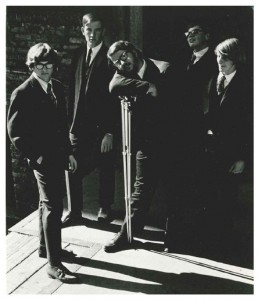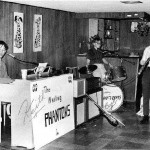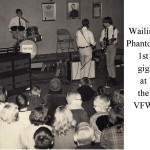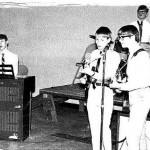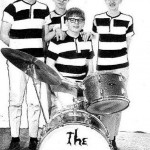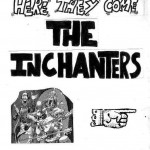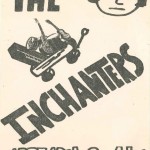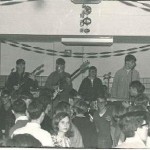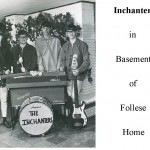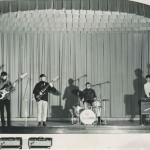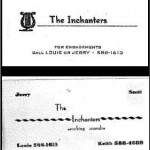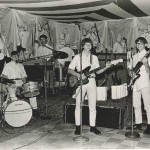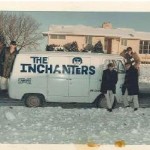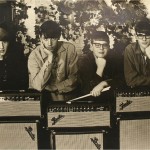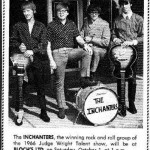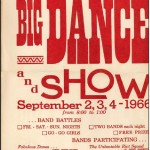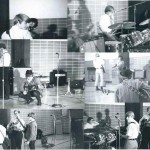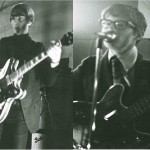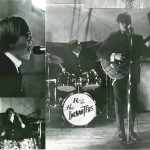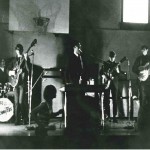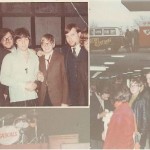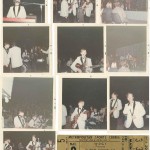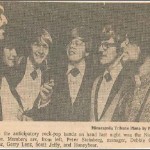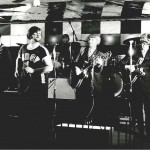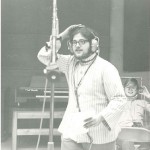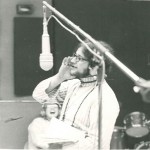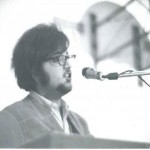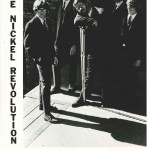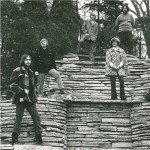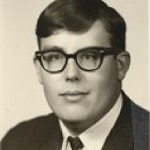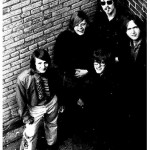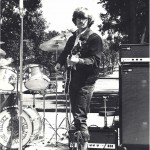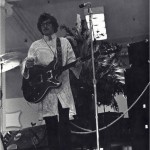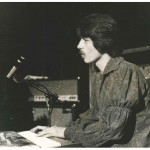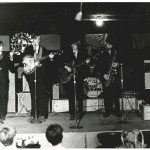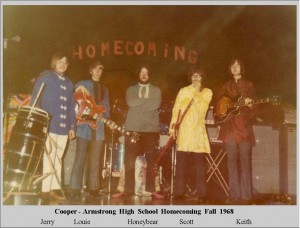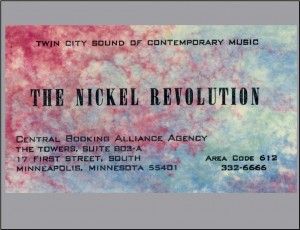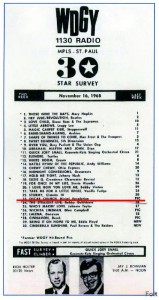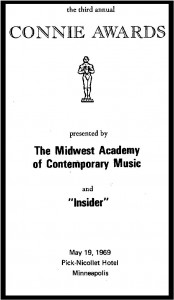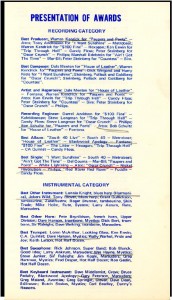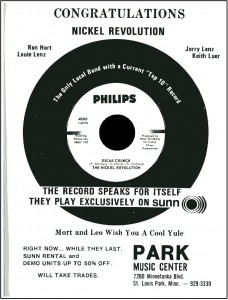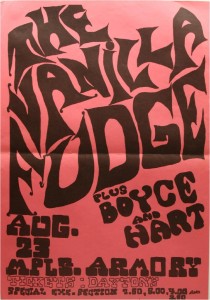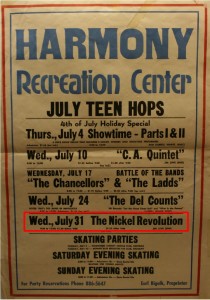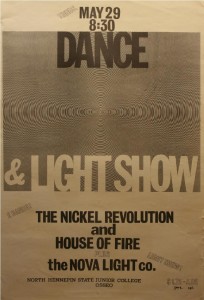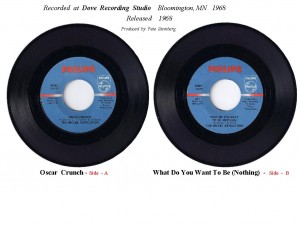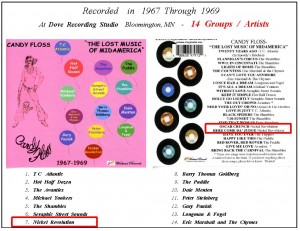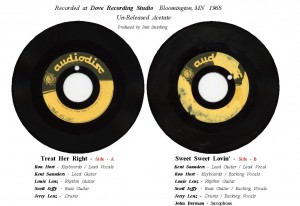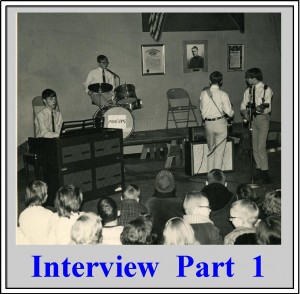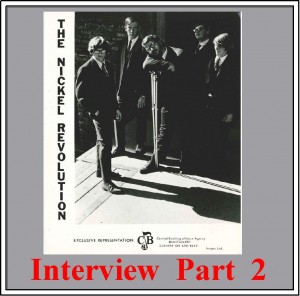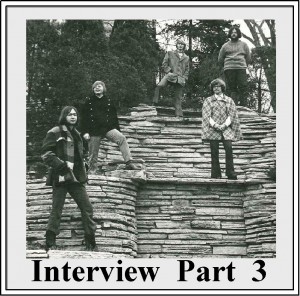Nickel Revolution
History
Nickel Revolution
(and the Wailing Phantoms and the Inchanters)
October, 1964: The Wailing Phantoms form with the following lineup: Keith Follese on keyboards and lead vocals; Louie Lenz on rhythm guitar; Scott Jeffy on bass guitar; and Jerry Lenz on drums. Louie and Scott attend Robbinsdale High School and Keith and Jerry are in Carl Sandburg Junior High School. After school the band practices at the Lenz home or the nearby Follese house. Keith and Jerry begin taking take the bus to downtown Minneapolis to check out the bands playing at the Dayton’s Top 10 Club on Saturdays, held in the 8th floor auditorium and later everyone is checking out the shows and music stores. The band learns to play a handful of songs including “The Grind,” (by local band Gregory Dee and the Avanties) and “Louie, Louie” by The Kingsmen.
December, 1964: The Wailing Phantoms play their one public performance, a Christmas party for children held at a VFW in South Minneapolis, where Jerry and Louie’s father is a member. The band adds “Jingle Bells” to their song list for the occasion, with their limited song list played multiple times. Also at the Christmas party is local TV personality, Axel, host of a popular childrens show on Channel 4 (Axel’s Treehouse).
January, 1965: In January, the band changes its name to The Inchanters. The demand for teen bands in the twin cities increases and offers to play come in with more frequency. The band picks up a regular gig at the Robbinsdale Community Center on Friday nights for the junior high crowd and on Saturday nights for the senior high students. The Community Center is located above the Robbinsdale Police and Fire Department. The band also begins making steady appearances at the New Hope Pool on teen nights. In addition, the band plays for numerous school dances. The band’s songlist expands to include the following songs:
- “Glad all Over” (Dave Clark Five)
- “Long Tall Texan” (Kingsmen)
- “(I Can’t Get No) Satisfaction” (Rolling Stones)
- “Keep on Dancin'” (Gentrys)
- “Mrs. Brown, You’ve Got a Lovely Daughter” (Herman’s Hermits)
- “Summertime Blues” (Eddie Cochran)
- “Gloria” (Them/Shadows of Knight)
- “Love Light” (Bobby Blue Bland)
- “Mickey’s Monkey” (Smokey Robinson and the Miracles)
- “Born in Chicago” (Paul Butterfield Blues Band)
Summer, 1965: In the summer of 1965 the band is invited to play at the new teen center at a premier Minnesota resort, Breezy Point, located north of Brainerd. The band views this as a great opportunity as the offer includes food, lodging and recreation for several days at the lakeside resort. The band decides to play this job instead of staying in town to see the Beatles play at Metropolitan Stadium in Bloomington on August 21, 1965.
1966: Dick Shapiro from Central Booking Agency takes an interest in the band and starts to book the band. The band members join the Musicains Union. The band plays in town and also across the five state upper midwest area.
March, 1966: The band is booked to play a concert that has Dick Gregory (comedian and civil rights activist) on the bill at the Northwest Sate University in Missouri.
Late, 1966: The group goes through some personnel changes. Keith Follese leaves the band and is replaced by Ron “Honeybear” Hort and Jeff Simon joins the band. The new lineup is: Ron Hort on keyboards and lead vocals; Jeff Simon on lead guitar; Louie Lenz on rhythm guitar; Scott Jeffy on bass guitar and Jerry Lenz on drums. With a new band lineup, a new musical direction (adding more rock, R & B, blues/folk songs) and with encouragement from booking agent Dick Shapiro (CBA) the band comes up with a new name… Nickel Revolution. At a Saturday morning band meeting, while going over a list of potential band names, Scott picks up the local Minneapolis Tribune newspaper looking for ideas and comes across an article on a “nickel revolution” that reports on the United States government dropping 90 percent silver coins from production and replacing them with coins made of cheaper metals resulting in a coin shortage as people saved the older silver coins instead of spending them. With a new band name:, Nickel Revolution, local musician Skip Dahlin (original bass player with The Accents) comes up with a logo for the band that is based on the Indian Head nickel. The logo is used on Jerry’s bass drum head. The band gerts signed to Central Booking Agency with Dick Shapiro booking the band. The band plays locally and out of town at: University of Minnesota Fraternity parties; Magoo’s; the Purple Barn; the Prison; Someplace Else; and Danceland… as well as out of town clubs and ballrooms including: Valhalla (Worthington); The Fun House (Pierz); The Tower (Austin); George’s Ballroom (NewUlm); The Blazer (Nisswa) and across the border in Wisconsin at The London Inn inEau Claire.
July, 1967: The band goes through another change in members. Jeff Simon leaves and is replaced by Kent Saunders on lead guitar and vocals. Shortly thereafter the group starts doing more R&B songs and John (“The Fly”) Berman is added on sax, helping to develop a show band style. The “show band” version of Nickel Revolution has the following lineup: Ron Hort on keyboards and lead vocals; Kent Saunders on lead guitar and vocals; Louie Lenz on rhythm guitar; John Berman on saxophone; Scott Jeffy on bass guitar and Jerry Lenz on drums. The band members now perform in tuxedos and Kent and John add dance steps to the show (Kent taught John). With a sax player now in the band a new musical dimension is added to the R & B songs. Songs the band now plays include the following:
- “Midnight Hour” and “Mustang Sally” (Wilson Pickett)
- “Shotgun” (Junior Walker and the All Stars)
- “Stormy Monday” (T-Bone Walker)
- “St. James Infirmary” (traditional blues song)
November, 1967: Dick Shapiro books The Young Rascals at the Minneapolis Auditorium and arranges for Nickel Revolution to pick up the band (and their equipment) at the airport, drive them to the Minneapolis Auditorium where they are booked and help set up the band’s gear. The band rents a U-Haul trailer and hooks it up to the back of their minivan. The band gets to hang out with Dino Danelli, Felix Cavaliere, Eddie Brigatti and Gene Cornish, before and after the concert and also get front row tickets for the show. The following day the band drives the band (and their equipment) back to the airport as they are on tour and off to their next job.
Late, 1967: Nickel Revolution, along with several other CBA bands agrees to contract with Candy Floss Productions for recording and management and musical development.
Early, 1968: The band enters Dove Recording studio in Bloomington for Candy Floss and record a cover of “Sweet Lovin’” (Claude King) along with “Treat Her Right” (Roy Head). An acetate of the 45 is pressed but the two songs are never released.
Shortly after the first trip to the studio, the guys at Candy Floss come up with an idea for a new song. They want Nickel Revolution to record an original song called “Here Come Da Judge,” written by Barry Goldberg, Gary Paulak, Dale Menten and Pete Steinberg. The song comes from a popular comedy sketch that is a regular feature on the highly successful “Rowan and Martin’s Laugh In” television show. Ron Hort records a number of lead vocal takes using his “normal” voice, however, nothing seems to click. Ron decides to try a new idea, singing in a heavy Yiddish accent that brings life to the song and results in approval (and out of control laughter) from everyone at the recording session.
The Candy Floss producers mix the tune and make dubs and immediately shop the 45 to record companies, offering a surefire “novelty” hit to the first label ready to take a risk. However, no labels contacted by Candy Floss show any interest in the song. Candy Floss were not the only production company to come with a song based on the “Here Come Da Judge” comedy skit. In fact, dozens of bands across the country were racing to record their own versions of “Here Come Da Judge” influenced songs. One notable version was recorded by Shorty Long on Motown Records.
March 8, 1968: Local radio station WDGY promotes “Super Scene 68” a concert held at the Metropolitan Sports Center in Bloomington. Nickel Revolution and other local bands play before the headline acts: Wilson Pickett, The Hollies and The Strawberry Alarm Clock. Jerry Lenz loans out his cowbell to Strawberry Alarm Clock drummer Gene Gunnels (the cowbell was prominent in their hit song “Incense and Peppermints”). This would be one of the last gigs with Kent and John as the band begins to change its musical direction and style.
Spring, 1968: The Nickel Revolution move into a more progressive rock sound. Kent Saunders and John Berman exit the band and Keith Luer joins the band. The new lineup is: Ron Hort on keyboards and lead vocals; Keith Luer on lead guitar and vocals; Louie Lenz on rhythm guitar; Scott Jeffy on bass guitar; and Jerry Lenz on drums and vocals. With a new sound, the band takes on a new look, dressing in the psychedelic “hippie” style of the era. In addition to original songs by Keith Luer, the band now plays songs that include the following:
- “Foxy Lady” (Jimi Hendrix)
- “You Keep Me Hangin’ On” (Vanilla Fudge version of The Supremes’ song)
- “Born to be Wild” (Steppenwolf)
- “Tuesday Afternoon” (Moody Blues)
- “Sunshine of Your Love” (Cream)
- plus various songs by Creedence Clearwater Revival
Candy Floss Productions enter the Nickel Revolution in a contest sponsored by Connie’s Insider (a local music magazine published by Connie Hechter) and Mercury Records for the 1968 “Best New Material” category in the Annual Connie Awards competition. Whoever wins the competition has a shot at having their single on the Mercury/Phillips label. The band reports to the studio for the session which is controlled by the guys at Candy Floss Productions. Producer Pete Steinberg is promoting the bubblegum sound at this time. Much to the surprise of the band they are informed that their song has already been recorded with Gary Paulak on lead vocals. Pete Steinberg informs the band that he only wants them to sing background vocals along with Barry Goldberg, Whip Lane and Gary Paulak. The song “Oscar Crunch” was written by Gary Paulak, Barry Goldberg and Pete Steinberg. For the “B” side of the 45, Nickel Revolution record a song they were contractually obligated to pick from the Mercury/Phillips publishing catalog. An obscure song recorded by Bunche’s A Good (with no chart action) is chosen called “What Do You Want To Be (Nothing)?” The song features Keith Luer on lead vocals and guitar; Ron Hort on keyboards; Louie Lenz on rhythm guitar; Scott Jeffy on bass guitar and Jerry Lenz on drums.
May 27, 1968: The band wins the competition at the Connie Awards ceremony and are pictured on the cover of The Minneapolis Tribune the next morning. The songs are sent to Mercury and recording contracts are signed, a process that includes going through probate court, as several band members are under the age of 21.
Summer, 1968: Mercury releases the Nickel Revolution 45 on the Phillips label. “Oscar Crunch” is an off the wall novelty song that quickly becomes a top ten radio song in the twin cities and several other midwest markets and gets scattered airplay on the east coast as well. The record is played on Dick Clark’s American Bandstand television show. Dick Clark was “surveying the nation” and had called on local radio station KDWB to ask them for their hottest pick and was informed about “Oscar Crunch” by Nickel Revolution. Although the band is now playing more progressive rock and psychedelic music, “Oscar Crunch” is added to the set list with Jerry Lenz on lead vocals.
August 23, 1968: The Nickel Revolution opens up a concert at the Minneapolis Armory. On the bill are Tommy Boyce and Bobby Hart, the 1910 Fruitgum Company and Vanilla Fudge. Following Nickel Revolution, Boyce and Hart perform. After Boyce and Hart finish their set, it is announced that the headline act, Vanilla Fudge, would not be at the show and no reason was given. This information does not go over well with the crowd. The Minneapolis Tribune later reported: “A crowd of about 2,000 teenagers grew unruly – chanting, yelling obscenities – stomping their feet – when it was announced that the feature act at a pop concert, the Vanilla Fudge, wouldn’t appear.” And so it turned out that the bubblegum band fromNew Jersey, the 1910 Fruitgum Company, would be the headline act for the concert instead of the “heavy” rock band Vanilla Fudge from New York. No one at the Armory seemed to know what happened to the Vanilla Fudge and why they were a “no show” for the concert.
November, 1968: The band opens up for Question Mark and The Mysterians (out of Texas) at a concert hall in Champaign, Illinois.
The band is contacted by Dino Enterprises out of Indianapolis, Indiana, who book the band for an appearance on the “Upbeat” television show. The band travels to Cleveland, Ohio to tape their segment on the show at WEWS TV (hosted by Don Webster). The show, similar to American Bandstand, features bands lip-syncing their hit songs. Nickel Revolution “sing along” with their recording of “Oscar Crunch” and the taped show is aired in December on 100 NBC stations across the country, including Minneapolis–St. Paul.
Following the taping for the “Upbeat” television show, the band travels to Portsmouth, Ohio (Southeast of Cincinnati) to perform at Shawnee State University.
1969: The Nickel Revolution are playing a heavy schedule of midwest clubs and are turning down many of the dates Dino Enterprises is attempting to book, as many of the jobs are out of state and lack consistent or consecutive bookings to make touring possible. With “Oscar Crunch” getting airplay, the band is offered numerous jobs with various bubblegum groups… the problem is, the band’s song “Oscar Crunch” is the one and only bubblegum song the band plays and the band does not really fit in with the other bubblegum bands of the era.
The band plays some of “love-ins” concerts held outdoors at Loring Park, Powderhorn Park and the West Bank. In addition, the band plays at outdoor “festival” type concerts held in southern Minnesota and also in Wisconsin, a number of which are held at county fairgrounds. Some of the “festival” concerts are politically charged due to the current state of affairs in the country involving the war inVietnam, the draft and other political and social issues.
Fall, 1969: Ron Hort exits the band and is replaced by Mickey Larson on keyboards and vocals. One of the bands favorite venues at this time period is the London Inn in Eau Claire, Wisconsin and the band is booked there often.
1970: Mickey Larson leaves the band and Bob Fisher joins on keyboards. This version of the band (Keith, Bob, Louie, Scott and Jerry) play a small number of jobs and then founding members Louie, Scott and Jerry decide it is time to bring Nickel Revolution to a conclusion, as student deferments were ending and Scott would have to either enlist in the military service or be drafted and Jerry was now married with his first child on the way. In addition, the corporate world offered steady jobs and regular paychecks as opposed to being in a band full time.
March, 1970: Nickel Revolution comes to an end.
Update
In 2006, a CD was released called “Candy Floss: The Lost Music of Mid America” which contains “Oscar Crunch” and “Here Comes Da Judge.” The CD is on the Weekend Records label. This is the first time that “Here Comes Da Judge” is made available to the public.
In the fall of 2011, the band announced via the Internet that they were planning on playing a reunion concert in the Twin Cities in the late summer/early fall of 2012. In addition, band member Jerry Lenz made available highlights from the bands career and rare photos of the band.
In November, 2011, Jerry Lenz reported that Kent Saunders located the “lost tape” of the band’s Dove Studio recordings of “Sweet Lovin’” and “Treat Her Right” and the band has posted both songs on You Tube.
On September 1, 2012, the Nickel Revolution regrouped in Minneapolis to play a reunion concert and party. Band members playing at the event were Jerry Lenz, Louie Lenz, Scott Jeffy, Kent Saunders and Keith Luer.
Photos
Recordings
Oscar Crunch – 1st. 45 Record – Side A
What Do You Want To Be ( Nothing ) – 1st. 45 Record – Side B
Here Comes The Judge – 2nd. 45 Record
Treat Her Right – Un-Released Master
Sweet Sweet Lovin’ – Un-Released Master
Bandtree
Nickel Revolution BAND TREE
Nickel Revolution 1966 to 1970
____________________________________________
Louie Lenz Rhythm Guitar / Vocals 1966 to 1970
Wailing Phantoms
Inchanters
NICKEL REVOLUTION
____________________________________________
Jerry Lenz Drums / Vocals 1966 to 1970
Wailing Phantoms
Inchanters
NICKEL REVOLUTION
The Nickel Blues Band (FL)
____________________________________________
Scott Jeffy Bass Guitar / Vocals 1966 to 1970
Wailing Phantoms
Inchanters
NICKEL REVOLUTION
Outside of Normal (AZ)
____________________________________________
Ron Hort Keyboards / Vocals 1966 to 1969
Hot Reu Chadludells
High School Group
NICKEL REVOLUTION
Honeybear
Illinois Speed Press
Chesterfield Gathering
Jokers Wild
Volcano
The Heartbreakers (CA)
Blues Image (CA)
Spenser Davis Group (LA)
The Bank (CA)
Bear Tracks
Soljern
Magic
Mozo Boji
________________________________________________
Mickey Larson Keyboards / Vocals 1969 to 1970
Dick Clark Road Shows
Tongue Band
NICKEL REVOLUTION
Mickey Larson Band
________________________________________________
Jeff Simon Lead Guitar 1966 to 1967
_______________
NICKEL REVOLUTION
___________________________________________
John Berman Sax 1967 to 1969
_______________
NICKEL REVOLUTION
_______________
________________________________________________________________________
Kent Saunders Lead Guitar / Vocals 1967 to 1969
The Four Fifths
NICKEL REVOLUTION
The Blues Cube
Jumbo
Chancellors
Sir Raleighs
The Blue Fox
Dave Mark Syndicate
Airborn
Tunesmith
Freelance Musician
___________________________________________
Bob Fisher Keyboards 1970 to 1970
_______________
NICKEL REVOLUTION
________________________________________________
Where are they now?
Louie Lenz: No longer active in music – Living in Minnesota
Jerry Lenz : Playing in Nickel Blues Band – Living in Orlando, Florida
Scott Jeffy : Playing in Outside of Normal – Living in Phoenix, Arizona
Ron “Honeybear” Hort: Passed away on November 11, 2013
Kent Saunders: Freelance Musician – Living in Minnesota
Mickey Larson: Passed away on August 12, 2004
John Berman: No longer active in music – Living in California
Jeff Simon: Unknown
Interview
Interview – Time = 25:33
Interview Part TWO – Time = 29:01
Interview Part THREE – Time = 25:02

